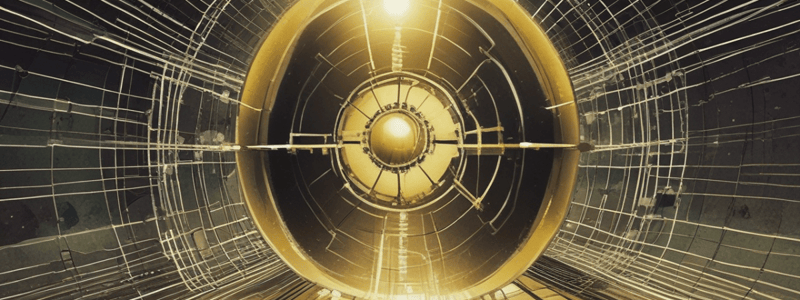Podcast
Questions and Answers
What is the definition of radioactivity?
What is the definition of radioactivity?
- The spontaneous breaking up of certain unstable nuclei (correct)
- The absorption of radiation by stable nuclei
- The artificial creation of radioactive isotopes
- The controlled emission of radiation
What is the term for elements with the same atomic number but different mass numbers?
What is the term for elements with the same atomic number but different mass numbers?
- Isomers
- Allotropes
- Radioisotopes
- Isotopes (correct)
What is the purpose of a Geiger-Muller tube?
What is the purpose of a Geiger-Muller tube?
- To measure the half-life of an isotope
- To detect radiation (correct)
- To amplify radiation
- To create radioactive isotopes
What is the name of the radioactive isotope used in smoke alarms?
What is the name of the radioactive isotope used in smoke alarms?
What is the application of Carbon-14 in archaeology?
What is the application of Carbon-14 in archaeology?
Which of the following scientists is credited with pioneering the work on radioactivity?
Which of the following scientists is credited with pioneering the work on radioactivity?
What is the result of alpha decay on an isotope?
What is the result of alpha decay on an isotope?
What is the purpose of Cobalt-60 in medicine?
What is the purpose of Cobalt-60 in medicine?
What is the name of the process by which a radioactive isotope decays?
What is the name of the process by which a radioactive isotope decays?
What is the result of beta emission on an isotope?
What is the result of beta emission on an isotope?
Flashcards are hidden until you start studying
Study Notes
Radioactivity
- Radioactivity is the spontaneous breaking up of certain unstable nuclei, accompanied by the emission of radiation.
Isotopes
- Isotopes are elements with the same atomic number but different mass number.
Half-Life
- The half-life of a radioactive isotope is the time taken for half the atoms in a sample of the isotope to decay.
History of Radioactivity
- Henri Becquerel pioneered radioactivity research.
- Marie and Pierre Curie continued this work by discovering polonium and radium.
Radiation Detection
- A Geiger-Muller tube is used to detect radiation.
Nuclear Reactions
- Nuclear reactions result in elements changing into other elements.
- Example: Carbon 14 decaying to form Nitrogen.
Types of Decay
- Beta emission:
- Atomic number increases by 1.
- Mass number remains the same.
- Alpha decay:
- Atomic number decreases by 2.
- Mass number decreases by 4.
Uses of Radioisotopes
- Archaeology: Carbon-14.
- Medicine: Cobalt-60 for cancer treatment.
- Smoke Alarms: Americium-241.
Studying That Suits You
Use AI to generate personalized quizzes and flashcards to suit your learning preferences.




